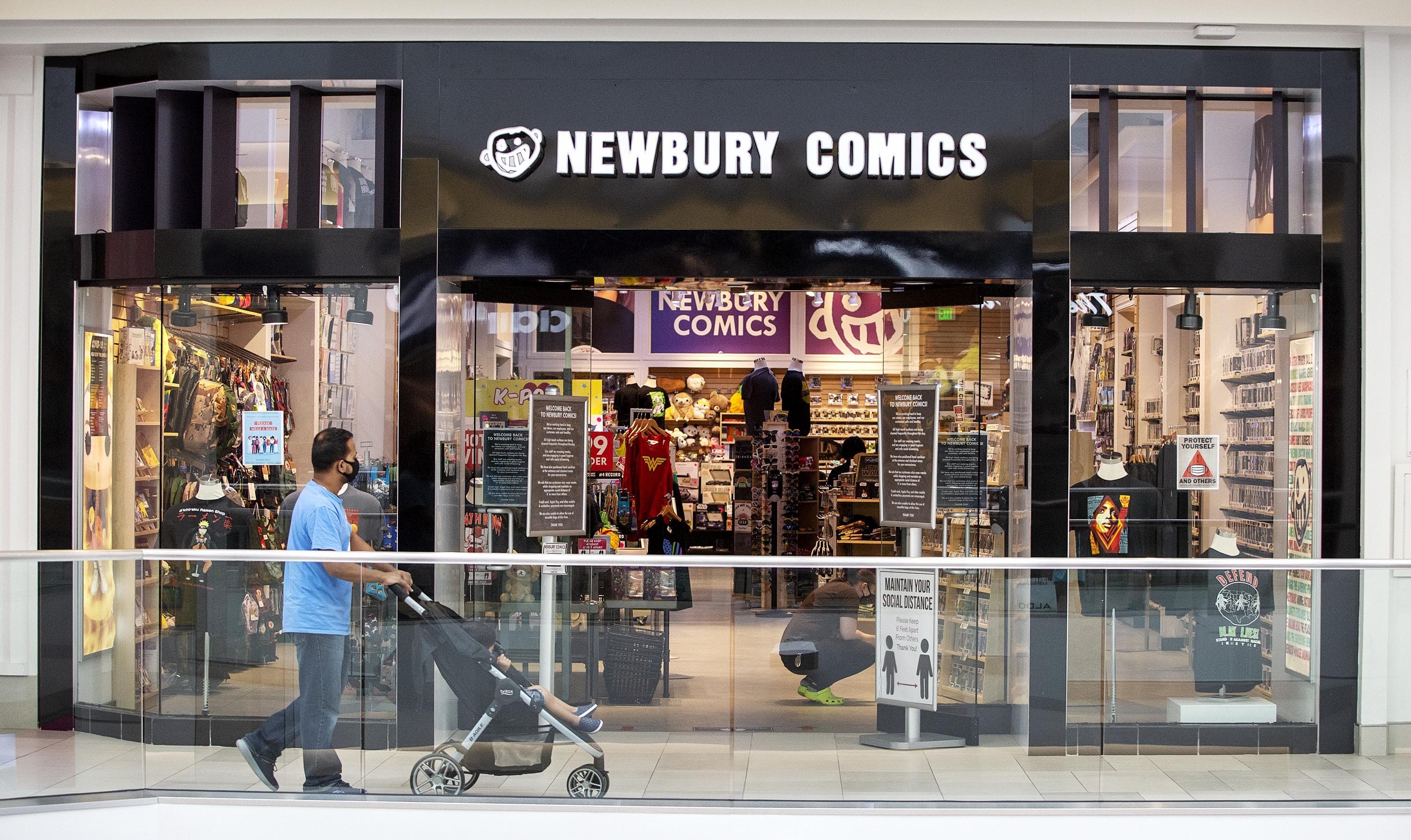Advertisement
What Can Public Radio Learn From A Quirky Regional Comics Store?

On a raw autumn evening in 1999, I attended a consumer focus group for Newbury Comics.
About a dozen of us sat around a table at a brewpub in Cambridge. While helping myself to a steak dinner and two pints of ale, I answered various questions about the store and the industry. At the end of the meal, we were all given a Newbury Comics $50 gift certificate (I spent mine in about 20 minutes).
By rights, that evening should be a distant memory. Instead, I find myself thinking about that focus group all the time.
If you're not from the Northeast, you've probably never heard of Newbury Comics. And even if you're familiar with the regional chain, you still might struggle to describe it. Imagine if Spencer Gifts merged with an indie record store: lava lamps, gag gifts, T-shirts you wouldn't wear to grandma's, and — in 1999 at least — lots and lots of compact discs. (There were undoubtedly some comic books tucked away in a corner, but I have almost no memory of them.)
But the store managers asking questions that night were squarely focused on those compact discs. More than half the questions concerned the digital downloading of music. And I remember — vividly — guffawing and thinking to myself: "What are these people afraid of? Free downloadable music? Really?"
Needless to say, I could not have been more wrong, and Newbury Comics could not have been more prescient. Napster — the infamous peer-to-peer file-sharing software — had been released only a few months earlier, and in the following months, despite slow internet speeds and subpar file quality, millions across the globe used it to acquire free music.
Two years later Napster as we know it had been sued out of existence, but as Chuck D noted at the time: "The dam has burst, and the chunks are in the water." Once people realized that compact discs could be turned into a series of bits and distributed across the world, there was no turning back.
Internet speeds got much faster. Audio quality improved. BitTorrent replaced Napster. People realized that they could share entire albums, TV episodes and even movies. Eventually, streaming services — millions of songs, shows and films at your fingertips! — made it all legal, and became hugely popular. Not surprisingly, compact discs sales plummeted and music retailers suffered.
Advertisement
And yet, almost every time I'm in a mall, I see ... a Newbury Comics store. That's right. They not only survived, they thrived. There are now 28 stores throughout New England and New York. The store still sells the expected T-shirts and pop-culture knickknacks. It even sells music, though usually in a form you can't really download: exclusive vinyl pre-releases and autographed compact discs.
A small record store chain survived the first two decades of the digital age and, in fact, prospered. It foresaw the coming changes, diversified its risk, made the appropriate adaptations and survived.
Sure, it's a niche, aimed at diehards and collectors. And who knows what the economic collapse of 2020 will do to all of retail, never mind ostensible comic book stores. But to reiterate: a small record store chain survived the first two decades of the digital age and, in fact, prospered. It foresaw the coming changes, diversified its risk, made the appropriate adaptations and survived.
If you currently consider your organization as just a newspaper or just a radio station, you are likely living on borrowed time.
Look at The New York Times. The company is of course still a newspaper (both online and print). But it's also a podcasting company that puts out some of the best and most popular podcasts (including a podcast that doubles as a public radio show). It's even acquiring other podcast studios. The Times is also a video production and distribution house. And it doesn't just create slick video accompaniments to its reporting; it produces Emmy-quality TV shows and Oscar-quality short-form documentaries. Oh yeah, it's also a tech company, somehow. And a unique consumer-goods review site.
Of course, that's The New York Times. We can't all be them. So let's look at something more humble. On The Water is a regional print and online fishing magazine. It's also a TV show. Also a clothing store (with, it should be noted, a brick-and-mortar retail space). And all of this is tied together with a robust, addictive social media presence.
It's not too late for public radio stations to do the same. Disruption has already arrived for radio, and it will only keep coming. So think about: creating podcasts, making videos (I know! I know!), sponsoring community events, hosting political debates, pairing up with unexpected partners. Think about delving into areas and platforms you've never even considered.
Most important, think about your bread and butter: short, thought-provoking audio pieces. Think about how they sound as isolated units, not part of a larger on-air show. Think about producing even more of these segments, while looking for subject niches you can leverage. And think about all the different ways and places you can get into listeners' ears and tell them your stories.
